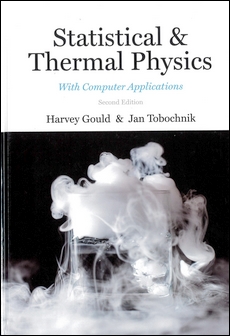書籍分類

Statistical and Thermal Physics: With Computer Applications 2/e (H)
作者:Harvey Gould, Jan Tobochnik
原價:NT$ 1,850
ISBN:9780691201894
版次:2
年份:2021
出版商:Princeton University
頁數/規格:530頁/精裝單色
參考網頁:Statistical and Thermal Physics: With Computer Applications 2/e
版次:2
年份:2021
出版商:Princeton University
頁數/規格:530頁/精裝單色
參考網頁:Statistical and Thermal Physics: With Computer Applications 2/e
內容介紹 目錄 作者介紹
- Description
- Completely revised to be more accessible to students
- Encourages active reading with guided problems tied to the text
- Updated open source programs available in Java, Python, and JavaScript
- Integrates Monte Carlo and molecular dynamics simulations and other numerical techniques
- Self-contained introductions to thermodynamics and probability, including Bayes’ theorem
- A fuller discussion of magnetism and the Ising model than other undergraduate texts
- Treats ideal classical and quantum gases within a uniform framework
- Features a new chapter on transport coefficients and linear response theory
- Draws on findings from contemporary research
- Solutions manual (available only to instructors)
This revised and expanded edition of Statistical and Thermal Physics introduces students to the essential ideas and techniques used in many areas of contemporary physics. Ready-to-run programs help make the many abstract concepts concrete. The text requires only a background in introductory mechanics and some basic ideas of quantum theory, discussing material typically found in undergraduate texts as well as topics such as fluids, critical phenomena, and computational techniques, which serve as a natural bridge to graduate study.
分類位置:
商管 > 統計 > 統計其他
理工 > 物理 > 工程物理


